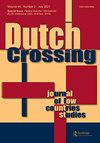Between Transnational Socialism and White Privilege: Afrikaner Woman Worker’s ‘Library’ in the 1930s and 1940s
IF 0.4
3区 历史学
Q1 HISTORY
Dutch Crossing-Journal of Low Countries Studies
Pub Date : 2022-11-17
DOI:10.1080/03096564.2022.2144594
引用次数: 0
Abstract
ABSTRACT In this article, I set out to introduce the Garment Workers Union (GWU) prose as a neglected part of Afrikaans-language literature. I offer an overview of texts written or translated by the GWU members and published in the official trade union organ Die Klerewerker/The Garment Worker. The presented workers’ reading list is divided into original Afrikaans writings and translations from English into Afrikaans. All these texts offered the newly created white working class a new identification, manoeuvring between belonging to the national imagined community of Afrikaners based on the concept of nation and whiteness, and to a transnational workers’ community based on the category of class. Looking at the impact of the Dutch and English language traditions in South Africa, I propose that the way in which European conventions made their way to Afrikaans literature, was class-based. Textsrecognized as artistic, incorporated in the Afrikaans literary canon, drew heavily on Dutch tradition. The English language turned out to be the medium that also circulated a less elitist thought. Therefore, it was English that enabled the movement of texts from Europe and the United States to South Africa that shaped the South African white working-class, including its Afrikaner part.在跨国社会主义和白人特权之间:20世纪30年代和40年代阿非利卡女工的“图书馆”
在这篇文章中,我着手介绍服装工人工会(GWU)散文作为南非荷兰语文学中被忽视的一部分。我提供了一份由GWU成员撰写或翻译并在官方工会组织Die Klerewerker/ the Garment Worker上发表的文本概述。所呈现的工人阅读清单分为南非荷兰语原文和从英语翻译成南非荷兰语。所有这些文本都为新成立的白人工人阶级提供了一种新的身份认同,在属于基于民族和白人概念的阿非利卡人的民族想象社区和基于阶级范畴的跨国工人社区之间进行操纵。看看荷兰语和英语语言传统对南非的影响,我认为欧洲传统对南非荷兰语文学的影响是以阶级为基础的。被认为是艺术的文本,融入了南非荷兰语文学经典,大量借鉴了荷兰传统。事实证明,英语也是传播不那么精英主义思想的媒介。因此,正是英语使得从欧洲和美国到南非的文本运动,塑造了南非白人工人阶级,包括其阿非利卡人部分。
本文章由计算机程序翻译,如有差异,请以英文原文为准。
求助全文
约1分钟内获得全文
求助全文

 求助内容:
求助内容: 应助结果提醒方式:
应助结果提醒方式:


